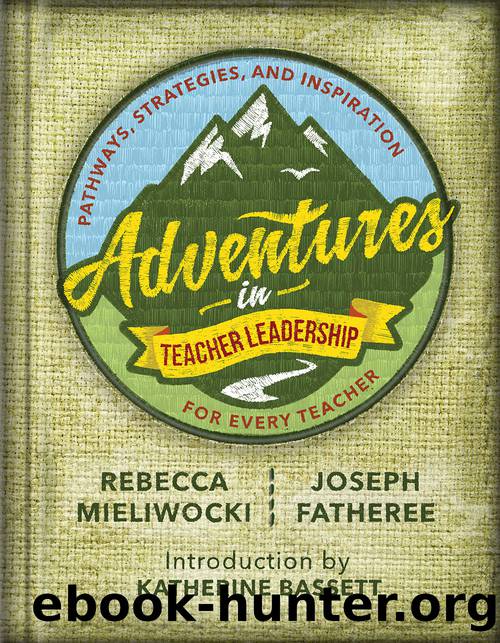Adventures in Teacher Leadership by Mieliwocki Rebecca;Fatheree Joseph;Bassett Katherine;

Author:Mieliwocki, Rebecca;Fatheree, Joseph;Bassett, Katherine; [Mieliwocki, Rebecca, Fatheree, Joseph]
Language: eng
Format: epub
Publisher: Association for Supervision & Curriculum Development
Published: 2019-04-02T00:00:00+00:00
Let Your Kids' Work Lead the Way
When developing professional development for a teacher or for groups of teachers, it's natural to focus on teaching practices, curricular choices, or student behavior. However, as John Hattie's (2012) research on "visible learning" so clearly demonstrates, it's teachers' understanding of their impact on learners that offers the best chance for growth and improvement.
Knowing a teacher's impact starts by looking at student work. When you come together, try to make student work samples the focus of your conversations. Ask questions such as these: (1) "What were you teaching that resulted in this student work?" (2) "What do you see when you look at these products?" (3) "What were you hoping to see from students?" (4) "Do you see that here, and if so, how well is it done? If not, why not?" (5) "What might you do differently to get a different result next time?"
In conversations that put student work at the center, two things happen. First, we get a student-facing view of the teaching that differs from the view that emerges when asking teachers how they felt a lesson went. So many times we are more critical of our teaching than is warranted. We've all had a lesson we felt was unsuccessful but resulted in terrific student work that didn't mesh with our internal assessment. We've also had days we felt were total winners, but student work and feedback didn't measure up. The clearest metric for how well we're doing can and should be from the students themselves. Starting with their work helps begin the conversation in the right way. The second thing that happens when student work is the centerpiece of the conversation is that defensiveness is minimized. Talking about students, their efforts, and what we see puts most teachers into an empathetic, curious state of mind, one where a search for strengths and answers is the focus. We often speak more carefully and thoughtfully about our students than about ourselves, and it's in this kinder place that personal growth has a chance to take root.
Download
This site does not store any files on its server. We only index and link to content provided by other sites. Please contact the content providers to delete copyright contents if any and email us, we'll remove relevant links or contents immediately.
| Administration | Assessment |
| Educational Psychology | Experimental Methods |
| History | Language Experience Approach |
| Philosophy & Social Aspects | Reform & Policy |
| Research |
The Art of Coaching Workbook by Elena Aguilar(50131)
Trainspotting by Irvine Welsh(21051)
Twilight of the Idols With the Antichrist and Ecce Homo by Friedrich Nietzsche(18312)
Fangirl by Rainbow Rowell(8808)
Periodization Training for Sports by Tudor Bompa(7937)
Change Your Questions, Change Your Life by Marilee Adams(7393)
This Is How You Lose Her by Junot Diaz(6463)
Asking the Right Questions: A Guide to Critical Thinking by M. Neil Browne & Stuart M. Keeley(5370)
Grit by Angela Duckworth(5304)
Red Sparrow by Jason Matthews(5208)
Paper Towns by Green John(4815)
Room 212 by Kate Stewart(4746)
Ken Follett - World without end by Ken Follett(4453)
The Sports Rules Book by Human Kinetics(4087)
Housekeeping by Marilynne Robinson(4075)
Double Down (Diary of a Wimpy Kid Book 11) by Jeff Kinney(3942)
Papillon (English) by Henri Charrière(3925)
The Motorcycle Diaries by Ernesto Che Guevara(3797)
Exercise Technique Manual for Resistance Training by National Strength & Conditioning Association(3791)
